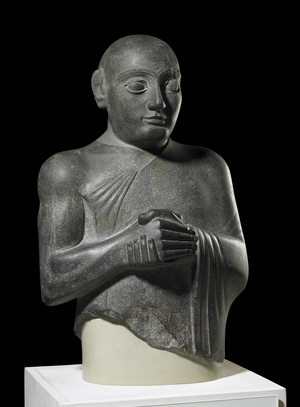New Discoveries in Iraq to be Presented Alongside British Museum Objects for the First Time in New Exhibition

A new British Museum touring exhibition Ancient Iraq: new discoveries marks the first time that the Museum will tour new Iraq field research in combination with key objects from the Museum's collection. Exploring the cultural heritage of Iraq through 80 remarkable objects, the exhibition seeks to highlight the challenges of protecting Iraq's rich and diverse cultural heritage following decades of conflict.
This new exhibition will travel exclusively to two UK venues in Newcastle and Nottingham between March and December 2020 through the British Museum's National Programmes. Ancient Iraq will present ground-breaking discoveries made by the British Museum and trainees as part of the British Museum's Iraq Emergency Heritage Management Training Scheme. Star objects within the exhibition will highlight the Scheme's two fieldwork projects in Iraq: in the south, archaeologists are excavating a temple belonging to the world's first urban civilisation; in the north, researchers have unearthed a massive fort located at the frontline of a conflict between two superpowers - the Roman and Parthian empires.
Ancient Iraq will showcase archaeological research into early cities through excavations at the site of Tello in southern Iraq, with one section focusing on the discovery and excavation of a major Sumerian temple complex. Ancient Sumerians (c.3000-2000 BC) are notable for inventing the world's first writing system, dating from five thousand years ago. On display in the exhibition for the first time outside of London will be a statue of Gudea, ruler of the ancient state of Lagash, which would have originally been erected within this very temple complex.
Stunning artefacts from the 'Royal Tombs' of Ur in present-day Iraq will provide a fascinating insight into life and death in these early cities. Luxurious grave goods crafted from gold, silver and lapis-lazuli demonstrate how the ruling elite displayed power through spectacular burial customs. These tombs were accompanied by a 'Death Pit' containing the elaborately dressed bodies of court attendants, who were sacrificed as part of the ruler's journey to the afterlife.
Key objects from the British Museum will also be linked with current field research in northern Iraq. Excavations at the previously unexplored site of Qalatga Darband have revealed a fortified settlement located at the frontline between the Roman and Parthian empires (dating to the second and first centuries BC). Iraq's position as the easternmost border of the Roman Empire was challenged by the Parthians, who embraced Greek cultural traditions brought to the region by Alexander the Great as he led his army across the Middle East. On display in the exhibition will be Greek-inspired statuettes, personal ornaments influenced by Greek mythology and gold burial masks, as well as a statue of Heracles.
The final section of the exhibition will address the recent appalling destruction of Iraq's rich cultural heritage by Daesh (the so-called Islamic State), and the work of the British Museum in response to it. Developed in 2014 at the height of this devastation, the Iraq Scheme delivers frontline fieldwork to Iraqi archaeologists, enabling them to assess, document and stabilise cultural heritage sites that have been damaged or destroyed by Daesh. The training consists of two months based at the British Museum, followed by two months of hands-on training at two excavation sites in Iraq. All of the finds from both sites remain in Iraq. The many new discoveries made at both sites in the Scheme show how much there is still to learn about Iraq's unique cultural heritage.
Gareth Brereton, Curator: Ancient Mesopotamia at the British Museum says: "Ancient Iraq: new discoveries will celebrate the rich cultural legacy of Iraq and the work currently underway through the British Museum's Iraq Scheme to protect this legacy for future generations. I am delighted that audiences in Newcastle and Nottingham will have the opportunity to view these fascinating objects in relation to the exciting new discoveries being made today. I hope that the exhibition will raise awareness of Iraq's immense importance to our shared understanding of human history."
Caroline McDonald, Manager at the Great North Museum: Hancock says: "We are excited to continue our partnership with the British Museum as the first hosts of this important new tour. Many of us enjoy living and working in cities; perhaps, though, we don't realise how much our urban way of life has been shaped by ancient civilisations like Sumer. This exhibition will open up the wonders of archaeology for our family audience and help visitors understand the contribution made by the Middle East in the history of humankind."
Clare Pickersgill, Keeper at the University of Nottingham Museum says: "This is a very timely exhibition and provides the opportunity to learn more about the cultural heritage of Iraq from those who have direct connection to it. We look forward to hearing about the work currently being undertaken in Iraq and working with local communities to understand more about the meaning and importance of the archaeology and cultural legacy. The University of Nottingham Museum is planning an exciting public and learning programme around the exhibition which will include something for everyone to find out about and enjoy."
A British Museum touring exhibition Ancient Iraq: new discoveries will be on display at Great North Museum: Hancock, Newcastle upon Tyne from 7 March until 2 August 2020 and at University of Nottingham Museum, Lakeside Arts between 19 September and 13 December 2020. Generously supported by the Dorset Foundation in memory of Harry M Weinrebe.
Comments

Videos
.png)